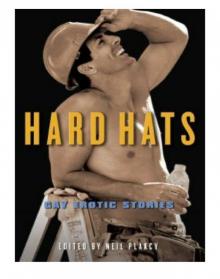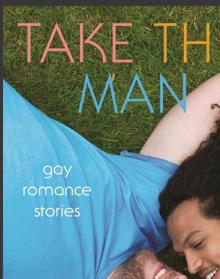- Home
- Neil Plakcy
Love on Stage Page 10
Love on Stage Read online
Page 10
“Can you sing for us?” his mother asked.
“I don’t know, Mom. Without the music and all…”
“Please, Gavin?”
He took a deep breath and tried to remember everything that Miles had taught him, then launched into “Apple Cider Time” a cappella.
Neither of his parents said anything while he sang. When he was finished, though, his father said, “That was even better than my mother. And that’s saying something. Remember, I grew up listening to that music.”
“I had no idea you could sing so well,” his mother said. “My goodness.”
Gavin didn’t think he was that great. He had begun to hear all the mistakes he made—the chord transpositions, the weak notes. He still had a lot of work to do.
“You guys,” he said. And then he found he couldn’t say anything more.
Baby Boy
The next morning at breakfast, his father announced, “I have a used Camry down at the lot I can lend you. You’re due to pick your grandmother up at ten.”
Gavin wasn’t quite awake yet. “For what?”
“To drive her to Starlit Lake,” his father said in his “my son is a small child” voice.
“Oh. You’re not driving us up?”
“Gavin, I have to work, and your mother has her…activities. We may come up one weekend to say hello.”
For some reason, Gavin had been expecting his entire family to cluster at Starlit Lake for the whole time. “Whatever.”
He rode to work with his father a little later.
“I expect you to look after your grandmother. She’s not as young as she used to be.”
Once again, the family talent for stating the obvious. “How old is she?” Gavin asked.
“Eighty-four. I want you to see she doesn’t work too hard. Don’t let her climb too many steps. If she gets tired, make sure you take her arm when she walks.” He looked at his son. “You’re twenty-two, Gavin. It’s time you woke up and started acting like an adult.”
His father had been saying something like that, with the age changing, ever since Gavin was about sixteen, he thought. When did you get too old to hear crap like that, he wondered as they drove into town. Did Grandma Frances still say to his dad, Richard, you’re fifty-seven years old. It’s time you started acting like an adult.
Probably not. His dad had been an adult for most of his life as far as Gavin could tell. His baby pictures advertised Kaz Cars—the used-car lot Grandpa Al had started in Eau Claire in the 1950s. His dad had grown up around the lot, washing cars and sweeping up the showroom. He’d studied business in college, and when he returned to Eau Claire, he had convinced Grandpa Al to open the first Toyota dealership in town. He belonged to the Kiwanis, the Rotary Club, and the Chamber of Commerce. Toyota of Eau Claire sponsored a Little League team and a Pop Warner football team, and his father was often at the games cheering. He couldn’t walk a block in town without seeing someone he knew, and every family restaurant dinner was interrupted at least twice by people who wanted to shake his dad’s hand or thank him for a great deal.
As they pulled into the dealership parking lot, Gavin felt an unexpected pang of gratitude for everything his father had done for him. He was sure that his parents would have preferred kids who were happy to stay in Eau Claire, marry, and give them grandchildren, but they had never once complained when Gretchen ran off to the West Coast or when Gavin wanted to move to Miami.
He leaned over and kissed his dad’s smooth cheek, smelling his old-fashioned aftershave. “Thanks for the car, Dad. And for everything else.”
“You’re welcome,” his father said. Gavin grabbed his duffel bag, and his father led him over to the Camry—a bland beige with dealer plates. “I need to make a copy of your driver’s license. For the records.”
Gavin handed it to him, and then while his father was inside, he walked around the car, carefully evaluating it. If there was a single ding or dent, he was going to point it out to his father before he left the lot, maybe even photograph it with his cell phone.
He found a long scrape on the bottom edge of the front bumper, and when his father came out, Gavin showed him.
“Yes, I know about that. But I’m glad you noticed it too.” He handed Gavin back his license, along with a copy of the vehicle registration.
“There’s also a dent back here,” Gavin said, pointing at the left rear wheel well. It was almost imperceptible unless you looked for it.
His dad laughed. “I guess you did pay attention to a few things I showed you.” Like his father, Gavin had washed cars as a teenager, and his father had trained him to look for and document anything wrong with a car. His dad leaned down and looked at the wheel well. “Good eye, son. I hadn’t seen that before.”
“Just wanted to make sure you didn’t blame it on me,” Gavin said blandly.
“Drive carefully, son,” his father said, then walked off.
Gavin slid into the driver’s seat. He didn’t have a car in Florida and didn’t need to borrow one very often. He heard his father’s voice in his head, instructing him to become familiar with all the controls before starting the car, and he wanted to ignore it, but the habit had become too ingrained in him. He identified the headlight wand, the location of the gas tank, the radio controls.
Then he backed carefully out of the space; if he banged up the car before even leaving the lot, he’d never hear the end of it.
Grandma Frances had sold her big house a few years before and moved into a bungalow. Gavin had only been there a couple of times on visits from college, and he wasn’t even sure which one was hers until she came out onto her porch and waved as he cruised slowly down the street.
He pulled up by the curb and bounded up the lawn to hug her. “Hi, Grandma.”
“Oh, my,” she said as he hugged her. Then she stepped back. “You look just like your father at your age. Skinnier, of course. Richard was always very solid. But I can see him in your face.”
Gavin took that as a compliment. “You ready to sing?”
“I have been singing my entire life, baby boy. Nothing new to me.”
She had already packed her ancient suitcase and a square box she called her “train case,” which held her makeup and medication. She had also packed a big cooler with prepared foods and had several bags of groceries to go as well. He made sure to help her down the two steps from the front porch, though she seemed pretty spry.
“When was the last time you all performed on stage?” he asked as they left the city limits of Eau Claire behind for the country roads that would take them up to Starlit Lake.
“I’ve been trying to remember,” she said. “It wasn’t exactly a stage, but Myrtle and Ida and I sang for the grand opening of the dealership. That was what, thirty years ago?”
“Never since?”
She shook her head. “Not the three of us. Myrtle, now, she kept on singing for a while after we broke up, as a solo act, and then she kept popping up like a bad penny all over the place.”
“A bad penny?” Gavin asked. “She can’t sing anymore?”
“It’s just an expression, baby boy. She just didn’t know when to stop is all.”
“Why did you stop?” Gavin asked.
“Oh, I don’t know,” Frances said. “It was a long time ago.”
“Grandma. You remember, I’m sure. Was it Grandpa Al? Did he make you stop?”
“Al? Oh no, he loved to hear me sing. He used to call me his nightingale.” She smiled and looked out the window. The hills were a verdant green, the fields full of rising cornstalks, the leafy tops of beets and carrots, the compact globes of lettuce and cabbage.
“It’s a difficult life, Gavin. Traveling all the time, always someplace new to perform. And we had to be at our best. People paid good money to hear us sing, and we had a responsibility to give them a show that was worth what they paid. Eventually it got to be too much work, and you know, I really wanted to settle down and have a family.”
“And you couldn’t d
o both?”
“Not back then you couldn’t.” She turned to face him. “Today, you can fly from Madison to Los Angeles in a couple of hours. I suppose you could fly out one day, perform on a TV show, then fly home the next day. But back then, we had to drive to Chicago and get on a train. It took a couple of days just to get there.”
He turned down the two-lane road that led to Starlit Lake. Through a screen of woods, he could see the very end of the lake and the tourist cabins that clustered there. He kept driving as the lake widened. Along the north shore, a half-dozen big, rambling houses had been built, each of them on an acre or more. The Brand house was the fourth one in. A curving driveway led from the street through a small patch of woods to the house itself.
The front faced the lake and had always been better landscaped. The house was three stories tall, with dormer windows on the third level. The room Gavin and Archie had shared as kids was back there, facing the woods. The rear windows had freshly painted green shutters.
A half-moon gravel drive passed the house’s back door. Erica’s sedan was already in the square lot, also gravel, where overflow cars were parked when the whole family was there. The backyard was left unmowed, amidst a scattering of pines and low shrubs, so that natural grasses could grow there, providing shelter for small wildlife, birds, and bugs.
Aunt Ida opened the back door and stepped outside. Her white hair was in a perfect bouffant, and she wore a pale-yellow sundress with filmy sleeves and matching yellow sandals. As usual, she wore enough jewelry to stock a small store: a dozen gold chains around her neck in different styles, gold bangle bracelets on each wrist, and gold rings with chunky stones on each finger.
“If Ida left a single piece of jewelry at her house, I’d be surprised,” Grandma Frances said. Gavin laughed as his grandmother stepped out of the car and embraced her sister. The three girls had never been tall, and the years had caused them to shrink. Both Frances and Ida barely topped five feet.
Frances and Ida walked around to the front of the house, talking, and Gavin dragged in the luggage.
Erica was in the kitchen drinking a glass of orange juice. “My grandma wanted to get here first to grab the pink bedroom,” she said. “You want to put Aunty Frances next to her?”
“How about if we put Myrtle next to her, then Frances? Myrtle can be the buffer.”
Myrtle was the middle sister, and she often mediated between Frances’s bossiness and Ida’s spoiled behavior.
“Good idea,” Erica said. “You need a hand?”
“Slap my butt and call me Sherpa, but you could bring in the groceries.”
One of Grandpa Al’s jokes had been a variant of that, ending with call me Shirley. No one knew where it had come from, but the kids had appropriated it after studying the climb to the top of Mount Everest and the role of the Sherpa porters.
Gavin climbed to the second floor, the traditional domain of the parental units, and saw that Erica had claimed one of the rooms there. He took the one next to hers, with a view of the lake, placid and sparkling in the morning sun.
He heard another car pull up in the back drive, and when he got downstairs, he was disappointed to find it was Archie and his grandmother, not Miles. When would he arrive, anyway? Where would they put him and all his stuff? And where would he and Miles be able to slip away, far from the prying eyes of his family?
After Myrtle and Archie were settled, the three cousins walked down to the lakefront together, to the small beach and the wooden dock where a rowboat was tied up. Three dark-green Adirondack chairs were clustered under a pair of swamp maples, and they sat down together.
The water lapped gently at the shore, and in the distance, they could hear a powerboat taking someone out water-skiing.
“How come you’re here so early?” Gavin asked Archie. “I thought you had to work every day.”
“Took a sick day. Don’t tell my boss.” He looked at the two of them. “So what do we do now?”
“When’s your friend getting here?” Erica asked Gavin.
He shrugged. “He said today. But he’s driving here from Nashville.”
“Is he really some big music producer?” Archie asked. “That’s what your dad says.”
“He’s produced songs for a bunch of different artists,” Erica said. “But I don’t think he’s ever done a whole album.”
“Is that what we’re doing? Recording an album?” Archie asked. “I thought we were just practicing for this show.”
They both turned to Gavin. “Don’t look at me. Miles invited himself up here.”
“Booty call!” Archie said.
Gavin was determined to keep the secret. “He’s just this guy I kind of know.”
“Yeah,” Erica said. “Guys I kind of know are falling over themselves to chase after me too.”
Gavin crossed his arms over his chest. He wished he did know why Miles had volunteered to come all this way, which he’d done before they’d gone to bed together. Had that been his way of sending a signal to Gavin? Was it just that he liked the Sweethearts’ music? Or was there something else going on, something that Gavin couldn’t see yet?
A Hip Vibe
After lunch, the sisters chose to take naps, and Gavin, Erica, and Archie decided to see how the three of them sounded together. “What do you want to sing?” Erica asked as they walked up the gravel drive away from the house. “‘Apple Cider Time’?”
Archie groaned. “Aren’t we going to sing that enough?” He began to sing the Jason Mraz song “I’m Yours,” and Erica chimed in at the chorus. Gavin was embarrassed that he wasn’t sure of the words or how to sing the tune, so he just listened. The two of them sounded so great together, their voices melding together as they walked between the trees.
“That was great,” Gavin said when they finished.
“Why didn’t you join in?” Erica asked.
“Didn’t know the words.”
“What do you know?”
His mind was a blank. He’d never been one to sing along with the radio, and when he had listened to the music on Miles’s playlist, he’d been focusing on so many different things that the words never penetrated.
“This land is your land,” Archie began, looking at Gavin.
At least he’d learned that in school. “This land is my land,” he sang.
Erica continued the melody, and then they all sang together, Gavin the baritone, Erica the soprano, Archie the bass.
“That was fun,” Erica said when they finished.
It was, Gavin thought.
They sang a couple of other folk songs they’d all learned as kids, and then as they walked back down the drive toward the house, an SUV pulled in behind them and they stepped aside to let it pass.
“That’s Miles,” Gavin said, waving.
Miles waved back but drove onward, stopping by the house. When they reached him, he was standing by the side of the SUV with the back hatch open. He looked great—another one of his concert T-shirts stretched over his chest. Board shorts that hung to his knees, his hipster goatee below his smile.
Gavin introduced them all shyly.
Archie looked in the back of the SUV and said, “Holy cow. You’ve got a lot of equipment here.”
Miles looked embarrassed. “I wasn’t sure what I’d need, so I loaded up the truck.”
“And moved to Beverly,” Erica sang.
“Hills, that is,” Gavin added. They’d often watched black-and-white TV shows of the sixties together as kids, memorizing the theme songs.
Archie finished the lyric with, “Swimming pools, movie stars,” in his bass.
Miles laughed and applauded. “I like the way you guys connect with each other.”
They decided on the fourth bedroom on the first floor, the one that faced the back drive, as the recording studio. By then, the three sisters were awake from their nap, and they were introduced to Miles and marveled at all the equipment he’d brought.
Gavin felt proud in a proprietary way. It looked like th
ings were going to work out. But he was eager to get Miles on his own, away from the family, for a kiss and maybe something more.
While Frances, Myrtle, and Ida bustled around the kitchen arguing about what to make for dinner, Gavin and his cousins helped Miles bring in all his equipment. Erica and Archie were both much more knowledgeable about what he’d brought, and Gavin ended up being the Sherpa again as his cousins helped with the setup. By the time dinner was ready, they had most of the stuff organized.
“We can do the rest after dinner,” Miles said.
They all sat down in the dining room, and Gavin was surprised to realize that this was the first time he could remember without at least a token member of the parents’ generation around.
“I’d love to hear about some of your experiences,” Miles said to Grandma Frances as they passed around the platter of roast chicken. “What was your first radio appearance?”
Frances looked at her sisters. “That was the Texaco Star Theatre, wasn’t it?”
Ida nodded. “With Gordon MacRae as the host. He was so dreamy!”
Gavin thought it was adorable, the way his great-aunt could transform almost immediately into a star-struck teenager.
“And you were on the TV version too, weren’t you?” Miles asked.
Aunt Myrtle nodded. “With Milton Berle as the host. The last time we were on, they had Gertrude Berg as special guest.” She turned to her sisters. “Remember how she forgot the words to her song and that little girl had to get her back on track?”
Each of the sisters had their own memories, and Miles lapped it all up. Gavin kept looking at him, then looking away quickly, hoping no one at the table would notice.
“You know a lot about that old-time music, don’t you?” Archie asked Miles.
Miles shrugged. “It’s the kind that interests me.”
“Not Pitbull and Gloria Estefan?” Gavin asked. He turned to his grandmother. “Those are some of the current artists Miles has worked with.”

 Three More Dogs in a Row
Three More Dogs in a Row Beach Bums
Beach Bums Sexy Sailors
Sexy Sailors Model Men
Model Men Love on the Web
Love on the Web Hard Hats
Hard Hats Honest to Dog
Honest to Dog Skater Boys
Skater Boys Beach Bums_Gay Erotic Fiction
Beach Bums_Gay Erotic Fiction Love on Stage
Love on Stage Zero Break
Zero Break Rhiannon
Rhiannon Surfer Boys
Surfer Boys The Outhouse Gang
The Outhouse Gang Take This Man
Take This Man Take This Man_Gay Romance Stories
Take This Man_Gay Romance Stories Genie for Hire
Genie for Hire